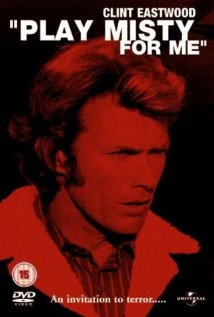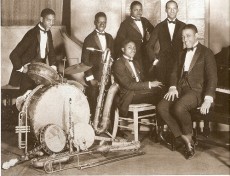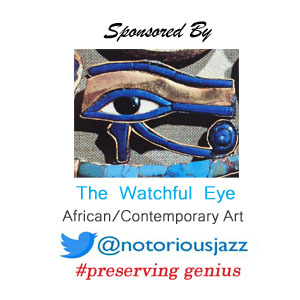
Daily Dose Of Jazz…
Anthony Wilson was born in Los Angeles, California on May 9, 1968 to bandleader Gerald Wilson. A guitarist and composer, he was influenced by Duke Ellington, Gil Evans, Wes Montgomery and T-Bone Walker. He received his degree in music composition from Bennington College.
Wilson released his debut self-titled album in 1997 that was nominated for a Grammy and his sophomore project the following year, Goat Hill Junket, garnered notice. He has recorded with his 9-piece band, two trio albums with organ, worked with Joe Bagg, Eva Scow, Larry Goldings, Jim Keltner and Jeff Hamilton.
Since 2001 Anthony has been a member of Diana Krall’s group performing notably the Grammy-winning Live in Paris. He has recorded ten albums as a leader and collaborated with Brazilian guitarist Chico Pinheiro on “Nova,” released in Brazil and the U.S. on their respective labels.
Guitarist Anthony Wilson can also be heard on a number of his father’s recordings and often plays live with the Gerald Wilson Orchestra whenever his schedule permits.
More Posts: guitar

Jazz In Film
Play Misty For Me: This 1971 film directed by Clint Eastwood tells the story of a brief fling between a male disc jockey and an obsessed female fan takes a frightening, and perhaps even deadly turn when another woman enters the picture.
Stars: Clint Eastwood, Jessica Walter, Donna Mills, John Larch, James McEachin, Irene Hervey
Music: Misty – Composed and performed by Erroll Garner; The First Time Ever I Saw Your Face - Written by Ewan MacColl and performed by Roberta Flack; and Country Preacher – composed by Joseph Zawinul and performed by Cannonball Adderley
The song, The First Time I Ever Saw Your Face was popularized by Roberta Flack in 1972 in a version that became a breakout hit for the singer. The song first appeared on Flack’s 1969 album First Take. Flack’s rendition was much slower than the original as an early solo recording by Seeger ran two and a half minutes long whereas Flack’s is more than twice that length.
This slower, more sensual version was used by Clint Eastwood in his 1971 directorial debut Play Misty for Me during a lovemaking scene. With the new exposure, Atlantic Records cut the song down to four minutes and released it to radio. It became an extremely successful single in the United States where it reached #1 on the Billboard Hot 100 and Easy Listening charts in April 1972 for six week runs on each.[3] It reached #14 on the UK Singles Chart.
More Posts: film

Daily Dose Of Jazz…
Jane Stuart was born in Jersey City, New Jersey on May 8th and started her singing career at age 5, on a local TV show, “Moser Starlites”. As a child she studied ballet, acting and singing that led her to study at Quintano’s School For Young Professionals and later study dance at Charlie Lowe’s School of Tap and Personality. Some of her classmates would be Bernadette Peters, Gregory Hines, Bonnie Bedelia, Patty Duke, Christopher Walken, Jeff Conaway and Alan Paul of the Manhattan Transfer.
She attributes her tap dancing skills to be the start of her understanding of jazz. Stuart would go on to play several Off-Broadway theatres, perform as part of the Jazz Mobile with Woody Shaw, Hal Vick and Freddie Waites among others. She has performed solo and background for national commercials and jingles, and was awarded the Blue Chip Award for Best Jazz Vocals by the International Association Of Jazz Educators.
Vocalist Jane Stuart has performed around the world and has worked with Thad Jones, Roland Hanna, Jon Faddis, George Mraz, Mel Lewis, Charlie Smalls, Vic Juris, to name a few, as well as a host of actors. In addition, she continues to stay busy teaching vocal technique and performance in the New Jersey area, as a member of “Reflections”, a 19-piece jazz/swing orchestra, singing and playing percussion with The Arthur Miller Band and leading her 7 piece band “Airtight”.
More Posts: vocal

Daily Dose Of Jazz…
Joe Ford was born on May 7, 1947 in Buffalo, New York and was singing in his mother and aunt’s family choir by age 5. At seven he started taking piano lessons and by the time he was eleven he started playing saxophone. In high school and college Joe played in a variety of campus jazz and funk bands.
Ford studied saxophone under Makanda Ken McIntyre, Jackie McLean and Frank Foster, and percussion under Joe Chambers. After graduating from Ohio’s Central State University He returned home to teach in the Buffalo public schools from 1968 to 1972. It was while working at the Buffalo Public Library in 1974 that Joe played in the Birthright Ensemble, and then would go on to join McCoy Tyner in 1976, recording eight albums with him through 1993.
Since the early 1980s Ford worked extensively as a sideman with Sam Jones, Lester Bowie, Jimmy Owens, Idris Muhammad, Abdullah Ibrahim, Chico O’Farrill, Avery Sharpe, Jerry Gonzalez, Malachi Thompson, Steve Berrios, Nova Bossa Nova and Freddy Cole amongst others.
In the late 1990s he led two ensembles, the Black Art Sax Quartet and a big band called The Thing. As a leader, saxophonist Joe Ford released his one album in 1993, “Today’s Night” on Blue Moon Records featuring Charles Fambrough, Kenny Kirkland and Jeff “Tain” Watts. He continues to perform and tour.
More Posts: saxophone

Daily Dose Of Jazz…
Charlie Irvis was born May 6, 1899 in New York City. He first played trombone professionally with Bubber Miley in his youth and then with blues singer Lucille Hegamin in the “Blue Flame Syncopators” from 1920 to 1921. Following this stint, Charlie played with Willie “The Lion” Smith and with Duke Ellington’s Washingtonians and later with his orchestra from 1924 to 1926. During the years 1923 to 1927 he also recorded occasionally with Clarence Williams.
Irvis, along with friends Miley and Tricky Sam Nanton contributed to the development of “jungle sounds” or “growl effects” in trombone playing. After leaving Ellington’s band, for the rest of the decade and into the early 1930s he recorded with Fats Waller, played with Charlie Johnson and Jelly Roll Morton. Some of his final recordings were in 1931 with Miley again, and shortly thereafter with Elmer Snowden.
After the early 1930s, Charlie Irvis, best known for his work with Duke Ellington’s band, stopped playing and passed away in New York City sometime around 1939 in obscurity. He is pictured 2nd from left in the photograph.
More Posts: trombone





